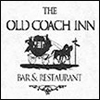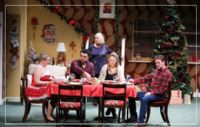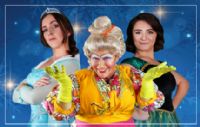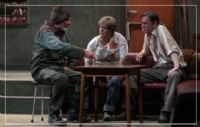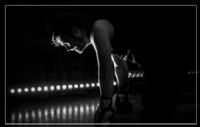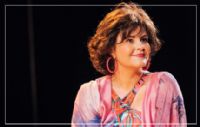Review: Madame Geneva
Date: 29/06/2017
Theatre Review
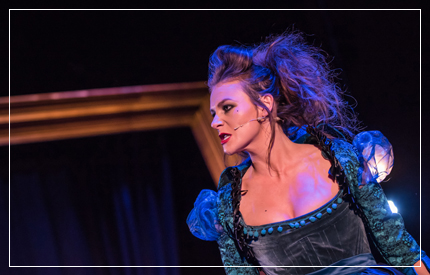
The first thing you should know about Madame Geneva is that its title character is not a madam. She's not even a real person. But Madame Geneva is important because she stands for the virtues and vices of gin. She is to that most "juniperous" of spirits what Uncle Sam is to the United States – emotive, symbolic and culturally significant. All adjectives that apply to this hyperactive show from Macha Productions, directed by Cara Kelly from a script by Jo Egan.
The next thing you should know about Madame Geneva is that it's as contradictory as its central figure. Flip-flopping back and forth through a sixty year time period from the seventeenth to the eighteenth century, it applies extremely disparate genres - musical, comedy and political debates - in a relentlessly fascinating bid to entertain, amuse and make its point. Which is, essentially, that gin and prostitution is both liberating and dangerous for the street folk who revel in it and the politicos who indulge it.
Beginning with the coming of William of Orange, this "tale of gin and prostitution" sees alcohol become more easily accessible to women, causing debate between those who cannot abide excessive decadence, and those who also see the new found whoredom as a sign of reformation, betterment even. Because, according to one voice, "if it weren't for prostitution no one would be earning anything at all." Such is the nature of the times.
Act One of the play is driven by this tone, a sort of Yes, Minister meets Les (literally) Miserables. As portrayed by the always good Kerri Quinn, Geneva is a cult, a figurehead, a pivot between the stuffy and downtrodden whose expressions are loyal to nothing but the positive and negative influence of the drink. Suffering, or thriving, on each side, are the twelve-strong Macha Ensemble and a selection of historic royalty and officials given multiple role-playing gravitas by the gifted quartet of Keith Singleton, Rhys Dunlop, John Cronin and Tony Flynn. All of this is staged in the very centre of the Lyric Theatre's Naughton Studio, a space that offers set designer, choreographer and cast so much to see and do.
To an extent, though, Madame Geneva's ambition threatens to undo it. Despite Egan's meticulous research and Kelly's concentrated direction, the play is arguably weakest when it attempts to be vocal with its politics, the conversations between the "important gentlemen" treading a very fine line between passionate naturalism and expositional monologuing.
Simultaneously they risk casting the ensemble and Quinn into the shadows, with the latter battling to retain her significance through a series of saucy, suggestive and devious postures on the sideline. But the clarity of the play's ultimate goal eventually encourages Kelly to release the handbrake and allow both chorus and cast to imbue their parts with astonishing, even audacious, physicality. Quinn becomes the consummate showgirl, revelling in the funk and rap that find their way into Garth McConaghie's gradually improving compositions and also in a ladder climbing stunt that elicits gasps. Similar admiration, joy even, can be found in Keith Singleton's drollery, a scene-stealing Andrew McClay, an increasingly funny John Cronin ("There is no such thing as love, only desire. Love exists for novels") and a late speech that is just reward for Tony Flynn's interesting features and eloquent diction.
It is as if at least some of the effects of gin have found its way into your genes - call it "ginetic" if you must. Just in time for World Gin Day (on June 10) too. Me, I can only quote Sam Spade and conclude that Egan and Kelly have painted gin as "the, er, stuff that dreams are made of". Good and bad.
Simon Fallaha
Madame Geneva ran in Belfast's Lyric Theatre from May 18 - 28. lyrictheatre.co.uk
The next thing you should know about Madame Geneva is that it's as contradictory as its central figure. Flip-flopping back and forth through a sixty year time period from the seventeenth to the eighteenth century, it applies extremely disparate genres - musical, comedy and political debates - in a relentlessly fascinating bid to entertain, amuse and make its point. Which is, essentially, that gin and prostitution is both liberating and dangerous for the street folk who revel in it and the politicos who indulge it.
Beginning with the coming of William of Orange, this "tale of gin and prostitution" sees alcohol become more easily accessible to women, causing debate between those who cannot abide excessive decadence, and those who also see the new found whoredom as a sign of reformation, betterment even. Because, according to one voice, "if it weren't for prostitution no one would be earning anything at all." Such is the nature of the times.
Act One of the play is driven by this tone, a sort of Yes, Minister meets Les (literally) Miserables. As portrayed by the always good Kerri Quinn, Geneva is a cult, a figurehead, a pivot between the stuffy and downtrodden whose expressions are loyal to nothing but the positive and negative influence of the drink. Suffering, or thriving, on each side, are the twelve-strong Macha Ensemble and a selection of historic royalty and officials given multiple role-playing gravitas by the gifted quartet of Keith Singleton, Rhys Dunlop, John Cronin and Tony Flynn. All of this is staged in the very centre of the Lyric Theatre's Naughton Studio, a space that offers set designer, choreographer and cast so much to see and do.
To an extent, though, Madame Geneva's ambition threatens to undo it. Despite Egan's meticulous research and Kelly's concentrated direction, the play is arguably weakest when it attempts to be vocal with its politics, the conversations between the "important gentlemen" treading a very fine line between passionate naturalism and expositional monologuing.
Simultaneously they risk casting the ensemble and Quinn into the shadows, with the latter battling to retain her significance through a series of saucy, suggestive and devious postures on the sideline. But the clarity of the play's ultimate goal eventually encourages Kelly to release the handbrake and allow both chorus and cast to imbue their parts with astonishing, even audacious, physicality. Quinn becomes the consummate showgirl, revelling in the funk and rap that find their way into Garth McConaghie's gradually improving compositions and also in a ladder climbing stunt that elicits gasps. Similar admiration, joy even, can be found in Keith Singleton's drollery, a scene-stealing Andrew McClay, an increasingly funny John Cronin ("There is no such thing as love, only desire. Love exists for novels") and a late speech that is just reward for Tony Flynn's interesting features and eloquent diction.
It is as if at least some of the effects of gin have found its way into your genes - call it "ginetic" if you must. Just in time for World Gin Day (on June 10) too. Me, I can only quote Sam Spade and conclude that Egan and Kelly have painted gin as "the, er, stuff that dreams are made of". Good and bad.
Simon Fallaha
Madame Geneva ran in Belfast's Lyric Theatre from May 18 - 28. lyrictheatre.co.uk









